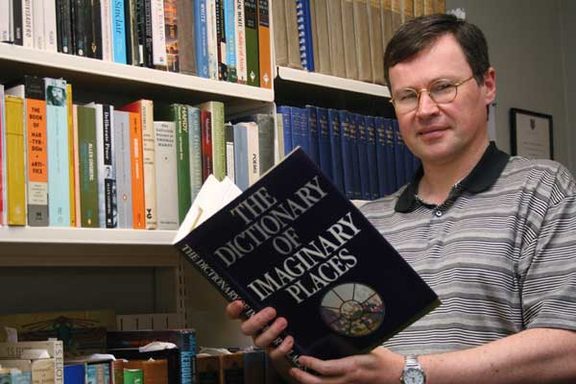New Poetry NZ Yearbook moves in many ways
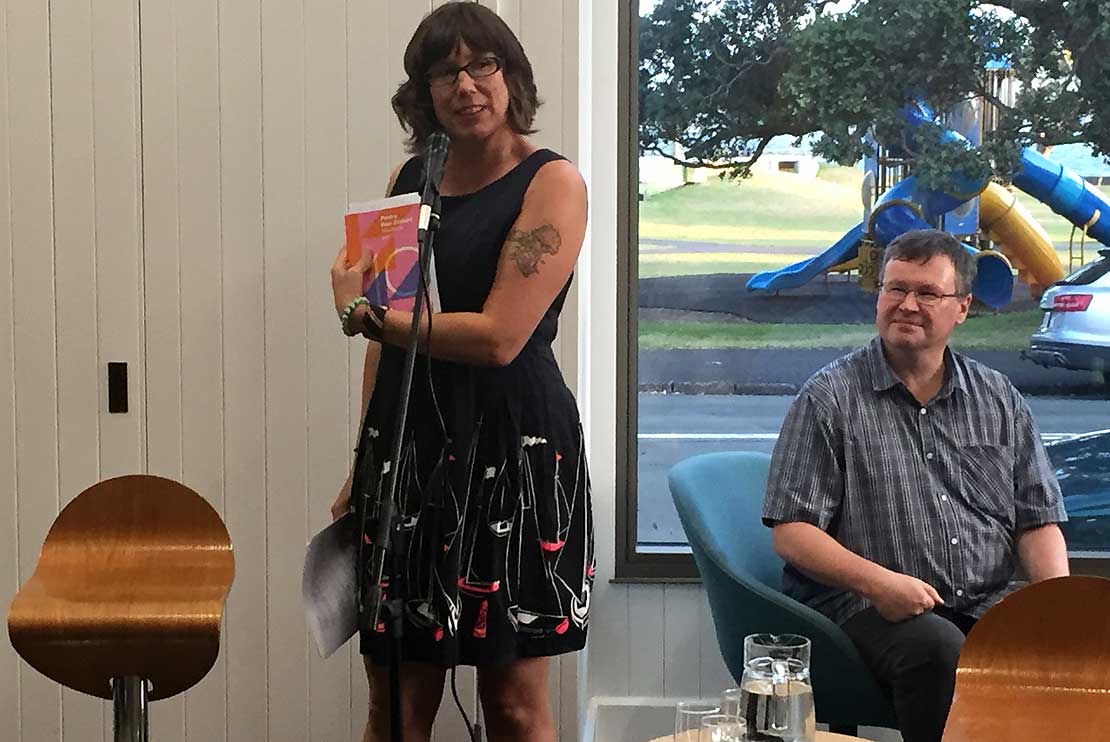 Poetry
NZ Yearbook 2019's featured poet Stephanie Christie, about to read her
work at the launch in Devonport Library, with Dr Jack Ross.
Poetry
NZ Yearbook 2019's featured poet Stephanie Christie, about to read her
work at the launch in Devonport Library, with Dr Jack Ross.
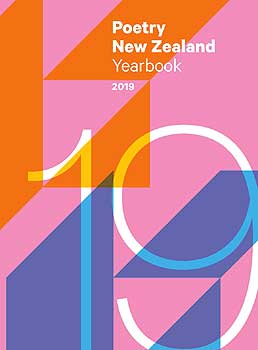 Poetry NZ Yearbook cover
Poetry NZ Yearbook cover
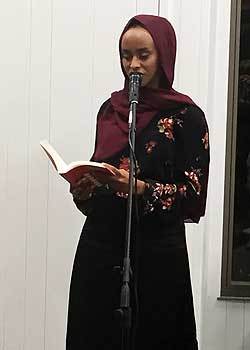 Poet Fardowsa Mohamed reads at the launch
Poet Fardowsa Mohamed reads at the launch
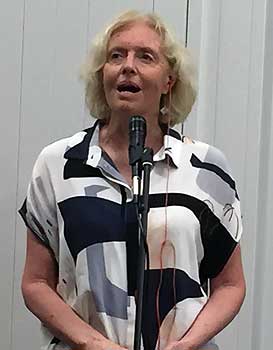 Poet Michele Leggott recites her new poem
Poet Michele Leggott recites her new poem
Laugh,
cry, take your breath away or send shivers down your spine – that’s how
editor Dr Jack Ross hopes his selection of 120 plus poems in the Poetry
New Zealand Yearbook 2019 will affect readers.
Launched
last week at the Devonport Library in Auckland to a packed room of over
200, issue number 53 of New Zealand’s longest-running poetry journal
and the third to be published by Massey University Press includes new
migrant voices, veteran poets and even a veterinary
professor-turned-poet.
Dr Ross, a poet, editor and senior
lecturer in the School of English and Media Studies at Massey’s Albany
campus, says the task of sifting through over a thousand submissions to
choose 130 for the book is formidable as well as a tremendous privilege.
Always with an ear tuned for fresh and challenging new voices and
views, he has mustered a bracing array of poetry from a diverse set of
writers.
From modern probes into religion, romance, love, death
and loss to the inner lives of a retail worker, a refugee, a doctor, a
drunk – the eclectic mix offers poems in a multitude of forms, including
prose pieces. As well as captivating lines by emerging poets there is
new work by some of the country’s most respected names, such as New
Zealand’s inaugural Poet Laureate Michele Leggott, along with Elizabeth
Smither, Emma Neale and Bob Orr. There are dual-text poems too, in
Chinese, German, Spanish and te reo Māori, as well as 20 poems and an
interview with featured Hamilton poet Stephanie Christie.
A
number of Massey graduates and staff who are also published authors made
the grade, including Professor Bryan Walpert, Dr Johanna Emeney, Dr
Matthew Harris, Bonnie Etherington, Sue Wootton and Jessica Pawley, who
wrote one of three literary essays in the book.
Wildbase vet a prize-winning poet
Another
Massey contributor is Brett Gartrell, a professor in Wildlife Health in
the School of Veterinary Science and clinical director of the
Veterinary Teaching Hospital at the Manawatū campus. He gained second
place and a $300 in prize money for his poem; ‘After the principal calls’.
Beyond
his day job saving injured native birds and animals and teaching others
how to do the same, he has been taking courses through the School of
English and Media Studies for the past decade, including on fiction
writing, creative non-fiction, children’s writing, life writing and
poetry.
“I never thought of myself as a poet previously, but I
was inspired by the teaching and poetry of Professor Bryan Walpert in
particular,” says Professor Gartrell, who has just completed a portfolio
of poetry and essay for his master’s of Creative Writing. “I’ve
discovered poetry as something that both challenges and intrigues me.”
His
foray into studying poetry has, he says, “given me a perspective on my
teaching. I have been challenged and mostly delighted by the teaching
excellence of my tutors and lecturers. I think all academics could
benefit from this role reversal from time to time.”
What does he
most like about writing poetry? “It’s the combination of creative flow
and control. It’s the challenge of allowing a poem to find its own
direction and surprising conjunctions which then needs to be followed by
the control of distillation; of condensing and communicating the most
complex of lyrical moments through the words and structure of the poem.
“As Jasper Fforde writes in First Among Sequels; “Whereas
story is processed in the mind in a straightforward manner, poetry
bypasses rational thought and goes straight to the limbic system and
lights it up like a brushfire. It's the crack cocaine of the literary
world.”
Poetry editor to ghost writer
“I feel the most
proud of this volume,” says Dr Ross, of the fifth consecutive edition of
the Poetry New Zealand he has edited, not including one as a guest editor
some years ago.
He says in the book’s introduction, What makes a poem good?, that
being moved emotionally has increasingly become his sense of a
successful poem, which may be about something funny, or painful or
revealing. “It’s not that I sit here boo-hooing as I read through all
the submissions for each issue – but every now and then something in one
of them sits up and looks alive, persuades me that something is being
worked out here that might be relevant to others simply because it seems
so relevant to me.”
Mostly, he hopes the book will help to make
poetry more visible, more accessible and maybe ignite new interest among
a wider, more culturally diverse audience. This edition is his last as
editor for the time being – he is handing the editorial reins for the
next issue over to Dr Johanna Emeney, a published poet and creative
writing lecturer at Massey. He is hoping to be able to devote more time
to working on his own writing, with a project in the pipeline to explore
his longheld fascination about ghost stories and the psychology behind
them.
Related articles
Massey University Press publishes 'Poetry New Zealand Yearbook'
Abundance of young voices in latest Poetry NZ
Te Reo surge in latest Poetry NZ
‘Machinery for imagining’ in Poetry NZ
Created: 13/03/2019 | Last updated: 13/03/2019










